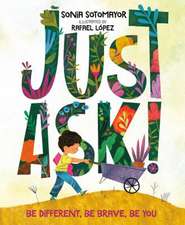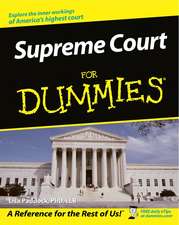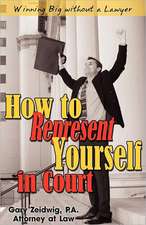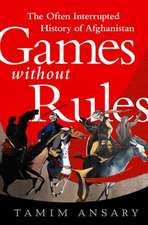My Beloved World
Autor Sonia Sotomayoren Limba Engleză Paperback – 23 feb 2014
Vezi toate premiile Carte premiată
Audies (2014)
Here is the story of a precarious childhood, with an alcoholic father (who would die when she was nine) and a devoted but overburdened mother, and of the refuge a little girl took from the turmoil at home with her passionately spirited paternal grandmother. But it was when she was diagnosed with juvenile diabetes that the precocious Sonia recognized she must ultimately depend on herself. She would learn to give herself the insulin shots she needed to survive and soon imagined a path to a different life. With only television characters for her professional role models, and little understanding of what was involved, she determined to become a lawyer, a dream that would sustain her on an unlikely course, from valedictorian of her high school class to the highest honors at Princeton, Yale Law School, the New York County District Attorney’s office, private practice, and appointment to the Federal District Court before the age of forty. Along the way we see how she was shaped by her invaluable mentors, a failed marriage, and the modern version of extended family she has created from cherished friends and their children. Through her still-astonished eyes, America’s infinite possibilities are envisioned anew in this warm and honest book, destined to become a classic of self-invention and self-discovery.
| Toate formatele și edițiile | Preț | Express |
|---|---|---|
| Paperback (2) | 99.19 lei 22-36 zile | |
| VINTAGE BOOKS – 23 feb 2014 | 99.19 lei 22-36 zile | |
| Large Print Press – 27 ian 2014 | 133.78 lei 22-36 zile | |
| Hardback (1) | 203.94 lei 22-36 zile | +31.09 lei 5-11 zile |
| Knopf Publishing Group – 14 ian 2013 | 203.94 lei 22-36 zile | +31.09 lei 5-11 zile |
Preț: 99.19 lei
Nou
Puncte Express: 149
Preț estimativ în valută:
18.98€ • 19.71$ • 15.83£
18.98€ • 19.71$ • 15.83£
Carte disponibilă
Livrare economică 03-17 martie
Preluare comenzi: 021 569.72.76
Specificații
ISBN-13: 9780345804839
ISBN-10: 034580483X
Pagini: 398
Ilustrații: illustrations
Dimensiuni: 132 x 204 x 23 mm
Greutate: 0.41 kg
Editura: VINTAGE BOOKS
Colecția Vintage Books
ISBN-10: 034580483X
Pagini: 398
Ilustrații: illustrations
Dimensiuni: 132 x 204 x 23 mm
Greutate: 0.41 kg
Editura: VINTAGE BOOKS
Colecția Vintage Books
Recenzii
“A compelling and powerfully written memoir about identity and coming of age…If the outlines of Justice Sotomayor’s life are well known by now, her searching and emotionally intimate memoir, My Beloved World, nonetheless has the power to surprise and move the reader…This account of her life is revealing, keenly observed and deeply felt…This insightful memoir underscores just how well Justice Sotomayor mastered the art of narrative. It’s an eloquent and affecting testament to the triumph of brains and hard work over circumstance, of a childhood dream realized through extraordinary will and dedication.”
—Michiko Kakutani, The New York Times
"The book delivers on its promise of intimacy in its depictions of Sotomayor's family, the corner of Puerto Rican immigrant New York where she was raised and the link she feels to the island where she spent childhood summers …This is a woman who knows where she comes from and has the force to bring you there. Sotomayor does this by being cleareyed about the flaws of the adults who raised her—she lets them be complicated…'I've spent my whole life learning how to do things that were hard for me,' Sotomayor tells an acquaintance when he asks whether becoming a judge will be difficult for her. Yes, she has. And by the time you close My Beloved World, you understand how she has mastered judging, too."
—Emily Bazelon, The New York Times Book Review
"With buoyant humor and thoughtful candor, she recounts her rise from a crime-infested neighborhood in the South Bronx to the nation's highest court. 'I will be judged as a human being by what readers find here,' Sotomayor writes. We, the jury in this case, find her irresistible."
—John Wilwol, Washingtonian
"Sotomayor turns out to be a writer of depth and literary flair…My Beloved World is steeped in vivid memories of New York City, and it is an exceptionally frank account of the challenges that she faced during her ascent from a public housing project to the court's marble palace on First Street."
—Adam Liptak, The New York Times
"You'll see in Sotomayor a surprising wealth of candor, wit, and affection. No topic is off limits, not her diabetes, her father's death, her divorce, or her cousin's death from AIDS. Put the kettle on, reader, it's time for some real talk with Titi Sonia…The author shines in her passages on childhood, family, and self-discovery. Her magical portraits of loved ones bring to mind Sandra Cisneros's The House on Mango Street; both authors bring a sense of childlike wonder and empathy to a world rarely seen in books, a Latin-American and womancentric world."
—Grace Bello, Christian Science Monitor
“This is a page-turner, beautifully written and novelistic in its tale of family, love and triumph. It hums with hope and exhilaration. This is a story of human triumph.”
—Nina Totenberg, NPR
"Big-hearted…A powerful defense of empathy…She has spent her life imagining her way into the hearts of everyone around her…Anyone wondering how a child raised in public housing, without speaking English, by an alcoholic father and a largely absent mother could become the first Latina on the Supreme Court will find the answer in these pages. It didn't take just a village: It took a country."
—Dahlia Lithwick, The Washington Post
“My Beloved World” is filled with inspiring, and surprisingly candid, stories about how the Supreme Court’s first Hispanic justice overcame a troubled childhood to attend Princeton and Yale Law School, eventually earning a seat on the nation’s highest court.”
—Carla Main, Wall Street Journal
"Remarkable…A portrait of a genuinely interesting person."
—Michael Tomasky, Daily Beast
"In a refreshing conversational style, Sotomayor tells her fascinating life story with the hope of providing “comfort, perhaps even inspiration” to others, particularly children, who face hard times. “People who live in difficult circumstances,” Sotomayor writes in her preface, “need to know that happy endings are possible."
—Jay Wexler, Boston Globe
"Classic Sotomayor: intelligent, gregarious and at times disarmingly personal…A portrait of an underprivileged but brilliant young woman who makes her way into the American elite and does her best to reform it from the inside…I certainly hope My Beloved World inspires readers to chase their dreams."
—Jason Farago, NPR
“Vital, loving, and incisive…In this revealing memoir, Supreme Court Justice Sotomayor candidly and gracefully recounts her formative years. Her memoir shows both her continued self-reliance and her passion for community.”
—Library Journal (Starred review)
“Justice Sotomayor recounts numerous obstacles and remarkable achievements in this personal and inspiring autobiography…Readers across the board will be moved by this intimate look at the life of a justice.”
—Publishers Weekly
“Amazingly candid… an intimate and honest look at her extraordinary life and the support and blessings that propelled her forward.”
—Booklist (Starred review)
“Graceful, authoritative memoir…Mature, life-affirming musings from a venerable life shaped by tenacity and pride.”
—Kirkus Reviews
—Michiko Kakutani, The New York Times
"The book delivers on its promise of intimacy in its depictions of Sotomayor's family, the corner of Puerto Rican immigrant New York where she was raised and the link she feels to the island where she spent childhood summers …This is a woman who knows where she comes from and has the force to bring you there. Sotomayor does this by being cleareyed about the flaws of the adults who raised her—she lets them be complicated…'I've spent my whole life learning how to do things that were hard for me,' Sotomayor tells an acquaintance when he asks whether becoming a judge will be difficult for her. Yes, she has. And by the time you close My Beloved World, you understand how she has mastered judging, too."
—Emily Bazelon, The New York Times Book Review
"With buoyant humor and thoughtful candor, she recounts her rise from a crime-infested neighborhood in the South Bronx to the nation's highest court. 'I will be judged as a human being by what readers find here,' Sotomayor writes. We, the jury in this case, find her irresistible."
—John Wilwol, Washingtonian
"Sotomayor turns out to be a writer of depth and literary flair…My Beloved World is steeped in vivid memories of New York City, and it is an exceptionally frank account of the challenges that she faced during her ascent from a public housing project to the court's marble palace on First Street."
—Adam Liptak, The New York Times
"You'll see in Sotomayor a surprising wealth of candor, wit, and affection. No topic is off limits, not her diabetes, her father's death, her divorce, or her cousin's death from AIDS. Put the kettle on, reader, it's time for some real talk with Titi Sonia…The author shines in her passages on childhood, family, and self-discovery. Her magical portraits of loved ones bring to mind Sandra Cisneros's The House on Mango Street; both authors bring a sense of childlike wonder and empathy to a world rarely seen in books, a Latin-American and womancentric world."
—Grace Bello, Christian Science Monitor
“This is a page-turner, beautifully written and novelistic in its tale of family, love and triumph. It hums with hope and exhilaration. This is a story of human triumph.”
—Nina Totenberg, NPR
"Big-hearted…A powerful defense of empathy…She has spent her life imagining her way into the hearts of everyone around her…Anyone wondering how a child raised in public housing, without speaking English, by an alcoholic father and a largely absent mother could become the first Latina on the Supreme Court will find the answer in these pages. It didn't take just a village: It took a country."
—Dahlia Lithwick, The Washington Post
“My Beloved World” is filled with inspiring, and surprisingly candid, stories about how the Supreme Court’s first Hispanic justice overcame a troubled childhood to attend Princeton and Yale Law School, eventually earning a seat on the nation’s highest court.”
—Carla Main, Wall Street Journal
"Remarkable…A portrait of a genuinely interesting person."
—Michael Tomasky, Daily Beast
"In a refreshing conversational style, Sotomayor tells her fascinating life story with the hope of providing “comfort, perhaps even inspiration” to others, particularly children, who face hard times. “People who live in difficult circumstances,” Sotomayor writes in her preface, “need to know that happy endings are possible."
—Jay Wexler, Boston Globe
"Classic Sotomayor: intelligent, gregarious and at times disarmingly personal…A portrait of an underprivileged but brilliant young woman who makes her way into the American elite and does her best to reform it from the inside…I certainly hope My Beloved World inspires readers to chase their dreams."
—Jason Farago, NPR
“Vital, loving, and incisive…In this revealing memoir, Supreme Court Justice Sotomayor candidly and gracefully recounts her formative years. Her memoir shows both her continued self-reliance and her passion for community.”
—Library Journal (Starred review)
“Justice Sotomayor recounts numerous obstacles and remarkable achievements in this personal and inspiring autobiography…Readers across the board will be moved by this intimate look at the life of a justice.”
—Publishers Weekly
“Amazingly candid… an intimate and honest look at her extraordinary life and the support and blessings that propelled her forward.”
—Booklist (Starred review)
“Graceful, authoritative memoir…Mature, life-affirming musings from a venerable life shaped by tenacity and pride.”
—Kirkus Reviews
Notă biografică
Sonia Sotomayor graduated summa cum laude from Princeton in 1976 and from Yale Law School in 1979. She worked as an assistant district attorney in New York and then at the law firm of Pavia & Harcourt. From 1992 to 1998, she served as a judge of the U.S. District Court, Southern District of New York, and from 1998 to 2009 on the United States Court of Appeals for the Second Circuit. In May 2009, President Barack Obama nominated her as an Associate Justice of the Supreme Court; she assumed this role on August 8, 2009.
Extras
From Chapter 11
I was working my way through the summer reading list when Lord of the Flies brought me to a halt. I wasn’t ready to start another book when I finished that one. I’d never read anything so layered with meaning: it haunted me, and I needed to think about it some more. But I didn’t want to spend the whole break doing nothing but reading and watching TV. Junior was happy shooting baskets all the daylight hours, but there wasn’t much else going on around the projects if you were too old for the playground and not into drugs. Orchard Beach still beckoned, roasting traffic and all, but getting there was a trek you couldn’t make every day. Besides, without Abuelita’s laugh and the anticipation of her overgenerous picnic in the trunk, without Gallego gunning the engine of a car packed with squirming kids, somehow it just wasn’t the same.
So I decided to get a job. Mami and Titi Carmen were sitting in Abuelita’s kitchen over coffee when I announced my plan. There were no shops or businesses in the projects, but maybe I could find someone to hire me in Abuelita’s old neighborhood. Titi Carmen still lived on Southern Boulevard and worked nearby at United Bargains. The momandpop stores under the El wouldn’t hire kids—leaning on family labor rather than paying a stranger—but the bigger retailers along Southern Boulevard might. I proposed to walk down the street and inquire in each one. “Don’t do that,” said Titi Carmen. “Let me ask Angie.” Angie was Titi Carmen’s boss.
My mother meanwhile looked stricken and bit her lip. She didn’t say anything until Titi had gone home. Then, for the first time, she told me a little bit about her own childhood: about sewing and ironing handkerchiefs for Titi Aurora since before she could remember, for hours every day. “I resented it, Sonia. I don’t want you to grow up feeling like I did.” She went on to apologize for being unable to buy us more things but still insisted it would be even worse if I blamed her one day for depriving me of a childhood.
I didn’t see that coming. Nobody was forcing me to work. Sure, a little pocket money would be nice, but that wasn’t the main motivation. “Mami, I want to work,” I told her. She’d worked too hard all her life to appreciate that leisure could mean boredom, but that’s what I knew I’d be facing if I sat home all summer. I promised never to blame her. In that moment, I began to understand how hard my mother’s life had been.
Titi Carmen reported back that Angie was willing to hire me for a dollar an hour. That was less than minimum wage, but since I wasn’t old enough to work legally anyway, they would just pay me off the books. I would take the bus, meet Titi Carmen at her place, and then we’d walk over to United Bargains together. That became our routine. It wasn’t a neighborhood where you walked alone.
United Bargains sold women’s clothing. I pitched in wherever needed: restocking, tidying up, monitoring the dressing rooms. I was supposed to watch for the telltale signs of a shoplifter trying to disappear behind the racks, rolling up merchandise to stuff in a purse.
Junkies were especially suspect. They were easy to spot by the shadow in their eyes, though the tracks on their arms were hidden under long sleeves even in summer. There was never an argument, never a scene. Once in a while I had to say, “Take it out.” Most of the time I didn’t need to utter a word. She would pull the garment out of her bag, put it back on the hanger, or maybe hand it to me, our eyes never meeting as she slinked out. We always let them go. There wasn’t much choice: in a precinct that had come to be known as Fort Apache, the Wild West, the cops had their hands full dealing with the gangs. Besides, the management understood that the shame and pity were punishment enough, and I naturally agreed. I abhorred feeling pitied, that degrading secondhand sadness I would always associate with my family’s reaction to the news I had diabetes. To pity someone else feels no better. When someone’s dignity shatters in front of you, it leaves a hole that any feeling heart naturally wants to fill, if only with its own sadness.
On Saturday nights the store was open late, and it was dark by the time we rolled down the gates. Two patrol officers would meet us at the door and escort us home. I don’t know how this was arranged, whether it was true that one of the saleswomen was sleeping with one of these cops, but I was glad of it anyway. As we walked, we could see the SWAT team on the roofs all along Southern Boulevard, their silhouettes bulging with body armor, assault rifles bristling. One by one the shops would darken, and we could hear the clatter of the graffiti-covered gates being rolled down, trucks driving off, until we were the only ones walking. Even the prostitutes had vanished. You might trip on tourniquets and empty glassine packets when you got into the courtyard area at Titi Carmen’s, but you wouldn’t run into any neighbors. I would spend the night there, talking the night away with Miriam. I wished Nelson were there too, but he was never home anymore.
I remember falling asleep thinking again about Lord of the Flies. It was as if the fly-crusted sow’s head on a stick were planted in a crack of the sidewalk on Southern Boulevard. The junkies haunting the alley were little boys smeared with war paint, abandoned on a hostile island, and the eyes of the hunters cruising slowly down the street glowed with primitive appetites. The cops in their armor were only a fiercer tribe. Where was the conch?
The next morning, in daylight, Southern Boulevard was less threatening. The street vendors were out, shop fronts were open, people were coming and going. On the way home I stopped at a makeshift fruit cart to buy a banana for a snack. I was standing there peeling my purchase when a police car rolled up to the curb. The cop got out and pointed here and there to what he wanted—there was a language barrier—and the vendor loaded two large shopping bags with fruit. The cop made as if to reach for his wallet, but it was only a gesture, and the vendor waved it off. When the cop drove away, I asked the man why he didn’t take the money.
“Es el precio de hacer negocios. If I don’t give the fruit, I can’t sell the fruit.”
My heart sank. I told him I was sorry it was like that.
“We all have to make a living,” he said with a shrug. He looked more ashamed than aggrieved.
Why was I so upset? Without cops our neighborhood would be even more of a war zone than it was. They worked hard at a dangerous job with little thanks from the people they protected. We needed them. Was I angry because I held the police to a higher standard, the same way I did Father Dolan and the nuns?
There was something more to it, beyond the betrayal of trust, beyond the corruption of someone whose uniform is a symbol of the civic order.
How do things break down? In Lord of the Flies, the more mature of those lost boys start off with every intention of building a moral, functional society on their island, drawing on what they remember—looking after the “littluns,” building the shelters, keeping the signal fire burning. Their little community gradually breaks down all the same, battered by those who are more self-indulgent, those who are driven by ego and fear.
Which side was the cop on?
The boys need rules, law, order, to keep their worst instincts in check. The conch they blow to call a meeting or hold for the right to speak stands for order, but it holds no power in itself. Its only power is what they agree to honor. It is a beautiful thing, but fragile.
When I was much younger, on summer days I would sometimes go along with Titi Aurora to the place where she worked as a seamstress. Those must have been days when Mami was working the day shift and, for some reason, I couldn’t go to Abuelita’s. That room with the sewing machines whirring was a vision of hell to me: steaming hot, dark, and airless, with the windows painted black and the door shut tight. I was too young to be useful, but I tried to help anyway, to pass the time. Titi Aurora would give me a box of zippers to untangle, or I’d stack up hangers, sort scraps by color, or fetch things for the women sewing. All day long I’d keep an eye out for anyone heading toward the door. As soon as it opened, I’d race over and stick my head out for a breath of air, until Titi saw me and shooed me back in. I asked her why they didn’t just keep the door open. “They just can’t,” she would say.
Behind the closed door and the blackened windows, all those women were breaking the law. But they weren’t criminals. They were just women toiling long hours under miserable conditions to support their families. They were doing what they had to do to survive. It was my first inkling of what a tough life Titi Aurora had had. Titi never got the schooling that Mami got, and she’d borne the brunt of the father Mami was spared from knowing. Her married life would have many challenges and few rewards. Work was the only way she knew to keep going, and she never missed a day. And though Titi was also the most honest person I knew—if she found a dime in a pay phone, she’d dial the operator to ask where she should mail it—she broke the law every day she went to work.
One evening at United Bargains, the women were making crank calls, dialing random numbers out of the phone book. If a woman’s voice answered, they acted as if they were having an affair with her husband, then howled with laughter at their poor gull’s response. Titi Carmen would join in, taking her turn on the phone and laughing as long and hard as any of them. I couldn’t understand how anyone could be so cruel—so arbitrarily, pointlessly cruel. What was the pleasure in it? Walking home, I asked her, “Titi, can’t you imagine the pain you’re causing in that house?”
“It was just a joke, Sonia. Nobody meant any harm.”
How could she not imagine? How could the cop not imagine what two large shopping bags full of fruit might measure in a poor vendor’s life, maybe a whole day’s earnings? Was it so hard to see himself in the other man’s shoes?
I was fifteen years old when I understood how it is that things break down: people can’t imagine someone else’s point of view.
Chapter Twelve
Three days before Christmas and midway through my freshman year at Cardinal Spellman High School, we moved to a new apartment in Coop City. Once again, my mother had led us to what seemed like the edge of nowhere. Coop City was swampland, home to nothing but a desolate amusement park called Freedomland, until the cement mixers and dump trucks arrived barely a year before we did. We moved into one of the first of thirty buildings planned for a development designed to house fifty-five thousand. To get home from school, I had to hike a mile—down Baychester Avenue, across the freeway overpass, and through the vast construction site of half-built towers and bare, bulldozed mud—before reaching human habitation. An icy wind that could lift you off your feet blew from the Hutchinson River. Flurries of snow blurred the construction cranes against an opaque sky of what seemed like Siberia in the Bronx.
At least now we lived close enough for me to walk to school, and I was glad of that. The hour-long trek by bus and train from Watson Avenue had been tedious. Poor Junior, who was only in sixth grade when we moved, would make the commute in reverse from Coop City to Blessed Sacrament for another two and a half years. No one we knew had ever heard of Coop City. My mother learned about it from some newspaper article on the city’s plans for building affordable housing. The cost of living there was pegged to income, and at the same time you were buying inexpensive shares in a cooperative, so in theory there was a tax break.
My mother was eager to get us into a safer place because the Bronxdale projects were headed downhill fast. Gangs were carving up the territory and each other, adding the threat of gratuitous violence to the scourges of drugs and poverty. A plague of arson was spreading through the surrounding neighborhoods as landlords of crumbling buildings chased insurance. Home was starting to look like a war zone.
It was Dr. Fisher who made the move possible. When he died, he left my mother five thousand dollars in his will, the final and least expected of the countless kindnesses that we could never repay, although we tried. When Dr. Fisher was hospitalized after his wife died, Abuelita made Gallego stop on the way to work every morning to pick up Dr. Fisher’s laundry and deliver clean pajamas to him.
Yes, Coop City was the end of the earth, but once I saw the apartment, it made sense. It had parquet floors and a big window in the living room with a long view. All the rooms were twice the size of those cubbyholes in the projects, and the kitchen was big enough to sit and eat in. Best of all, my mother’s friend Willy, a musician who did handiwork too, was able to partition the master bedroom into two little chambers, each big enough for a twin bed and a tiny bureau, so Junior and I could finally have separate rooms. Each had its own door, and Willy even let us each choose our own wallpaper. Junior chose something neutral, in a restrained shade of beige. Mine had constellations, planets, and signs of the zodiac in an antique style, as if a Renaissance cartographer had drawn a map for space travel.
I was reading a lot of science fiction and fantasizing about travel to other worlds or slipping through a time warp. It had been only the summer before, in July 1969, that two astronauts had walked on the moon, and I was awestruck that it had happened in my own lifetime, especially when I remembered how Papi had predicted this. From the earth’s leaders, Neil Armstrong and Buzz Aldrin carried messages etched in microscopically tiny print on a silicon disk, messages that could fit on the head of a pin, to be deposited on the surface of the moon. Pope Paul’s was from Psalm 8: “I look up at your heavens, made by your fingers, at the moon and stars you set in place. Ah, what is man that you should spare a thought for him? Or the son of man that you should care for him? You have made him a little less than an angel, you have crowned him with glory and splendor, and you have made him lord over the work of your hand.”
I was working my way through the summer reading list when Lord of the Flies brought me to a halt. I wasn’t ready to start another book when I finished that one. I’d never read anything so layered with meaning: it haunted me, and I needed to think about it some more. But I didn’t want to spend the whole break doing nothing but reading and watching TV. Junior was happy shooting baskets all the daylight hours, but there wasn’t much else going on around the projects if you were too old for the playground and not into drugs. Orchard Beach still beckoned, roasting traffic and all, but getting there was a trek you couldn’t make every day. Besides, without Abuelita’s laugh and the anticipation of her overgenerous picnic in the trunk, without Gallego gunning the engine of a car packed with squirming kids, somehow it just wasn’t the same.
So I decided to get a job. Mami and Titi Carmen were sitting in Abuelita’s kitchen over coffee when I announced my plan. There were no shops or businesses in the projects, but maybe I could find someone to hire me in Abuelita’s old neighborhood. Titi Carmen still lived on Southern Boulevard and worked nearby at United Bargains. The momandpop stores under the El wouldn’t hire kids—leaning on family labor rather than paying a stranger—but the bigger retailers along Southern Boulevard might. I proposed to walk down the street and inquire in each one. “Don’t do that,” said Titi Carmen. “Let me ask Angie.” Angie was Titi Carmen’s boss.
My mother meanwhile looked stricken and bit her lip. She didn’t say anything until Titi had gone home. Then, for the first time, she told me a little bit about her own childhood: about sewing and ironing handkerchiefs for Titi Aurora since before she could remember, for hours every day. “I resented it, Sonia. I don’t want you to grow up feeling like I did.” She went on to apologize for being unable to buy us more things but still insisted it would be even worse if I blamed her one day for depriving me of a childhood.
I didn’t see that coming. Nobody was forcing me to work. Sure, a little pocket money would be nice, but that wasn’t the main motivation. “Mami, I want to work,” I told her. She’d worked too hard all her life to appreciate that leisure could mean boredom, but that’s what I knew I’d be facing if I sat home all summer. I promised never to blame her. In that moment, I began to understand how hard my mother’s life had been.
Titi Carmen reported back that Angie was willing to hire me for a dollar an hour. That was less than minimum wage, but since I wasn’t old enough to work legally anyway, they would just pay me off the books. I would take the bus, meet Titi Carmen at her place, and then we’d walk over to United Bargains together. That became our routine. It wasn’t a neighborhood where you walked alone.
United Bargains sold women’s clothing. I pitched in wherever needed: restocking, tidying up, monitoring the dressing rooms. I was supposed to watch for the telltale signs of a shoplifter trying to disappear behind the racks, rolling up merchandise to stuff in a purse.
Junkies were especially suspect. They were easy to spot by the shadow in their eyes, though the tracks on their arms were hidden under long sleeves even in summer. There was never an argument, never a scene. Once in a while I had to say, “Take it out.” Most of the time I didn’t need to utter a word. She would pull the garment out of her bag, put it back on the hanger, or maybe hand it to me, our eyes never meeting as she slinked out. We always let them go. There wasn’t much choice: in a precinct that had come to be known as Fort Apache, the Wild West, the cops had their hands full dealing with the gangs. Besides, the management understood that the shame and pity were punishment enough, and I naturally agreed. I abhorred feeling pitied, that degrading secondhand sadness I would always associate with my family’s reaction to the news I had diabetes. To pity someone else feels no better. When someone’s dignity shatters in front of you, it leaves a hole that any feeling heart naturally wants to fill, if only with its own sadness.
On Saturday nights the store was open late, and it was dark by the time we rolled down the gates. Two patrol officers would meet us at the door and escort us home. I don’t know how this was arranged, whether it was true that one of the saleswomen was sleeping with one of these cops, but I was glad of it anyway. As we walked, we could see the SWAT team on the roofs all along Southern Boulevard, their silhouettes bulging with body armor, assault rifles bristling. One by one the shops would darken, and we could hear the clatter of the graffiti-covered gates being rolled down, trucks driving off, until we were the only ones walking. Even the prostitutes had vanished. You might trip on tourniquets and empty glassine packets when you got into the courtyard area at Titi Carmen’s, but you wouldn’t run into any neighbors. I would spend the night there, talking the night away with Miriam. I wished Nelson were there too, but he was never home anymore.
I remember falling asleep thinking again about Lord of the Flies. It was as if the fly-crusted sow’s head on a stick were planted in a crack of the sidewalk on Southern Boulevard. The junkies haunting the alley were little boys smeared with war paint, abandoned on a hostile island, and the eyes of the hunters cruising slowly down the street glowed with primitive appetites. The cops in their armor were only a fiercer tribe. Where was the conch?
The next morning, in daylight, Southern Boulevard was less threatening. The street vendors were out, shop fronts were open, people were coming and going. On the way home I stopped at a makeshift fruit cart to buy a banana for a snack. I was standing there peeling my purchase when a police car rolled up to the curb. The cop got out and pointed here and there to what he wanted—there was a language barrier—and the vendor loaded two large shopping bags with fruit. The cop made as if to reach for his wallet, but it was only a gesture, and the vendor waved it off. When the cop drove away, I asked the man why he didn’t take the money.
“Es el precio de hacer negocios. If I don’t give the fruit, I can’t sell the fruit.”
My heart sank. I told him I was sorry it was like that.
“We all have to make a living,” he said with a shrug. He looked more ashamed than aggrieved.
Why was I so upset? Without cops our neighborhood would be even more of a war zone than it was. They worked hard at a dangerous job with little thanks from the people they protected. We needed them. Was I angry because I held the police to a higher standard, the same way I did Father Dolan and the nuns?
There was something more to it, beyond the betrayal of trust, beyond the corruption of someone whose uniform is a symbol of the civic order.
How do things break down? In Lord of the Flies, the more mature of those lost boys start off with every intention of building a moral, functional society on their island, drawing on what they remember—looking after the “littluns,” building the shelters, keeping the signal fire burning. Their little community gradually breaks down all the same, battered by those who are more self-indulgent, those who are driven by ego and fear.
Which side was the cop on?
The boys need rules, law, order, to keep their worst instincts in check. The conch they blow to call a meeting or hold for the right to speak stands for order, but it holds no power in itself. Its only power is what they agree to honor. It is a beautiful thing, but fragile.
When I was much younger, on summer days I would sometimes go along with Titi Aurora to the place where she worked as a seamstress. Those must have been days when Mami was working the day shift and, for some reason, I couldn’t go to Abuelita’s. That room with the sewing machines whirring was a vision of hell to me: steaming hot, dark, and airless, with the windows painted black and the door shut tight. I was too young to be useful, but I tried to help anyway, to pass the time. Titi Aurora would give me a box of zippers to untangle, or I’d stack up hangers, sort scraps by color, or fetch things for the women sewing. All day long I’d keep an eye out for anyone heading toward the door. As soon as it opened, I’d race over and stick my head out for a breath of air, until Titi saw me and shooed me back in. I asked her why they didn’t just keep the door open. “They just can’t,” she would say.
Behind the closed door and the blackened windows, all those women were breaking the law. But they weren’t criminals. They were just women toiling long hours under miserable conditions to support their families. They were doing what they had to do to survive. It was my first inkling of what a tough life Titi Aurora had had. Titi never got the schooling that Mami got, and she’d borne the brunt of the father Mami was spared from knowing. Her married life would have many challenges and few rewards. Work was the only way she knew to keep going, and she never missed a day. And though Titi was also the most honest person I knew—if she found a dime in a pay phone, she’d dial the operator to ask where she should mail it—she broke the law every day she went to work.
One evening at United Bargains, the women were making crank calls, dialing random numbers out of the phone book. If a woman’s voice answered, they acted as if they were having an affair with her husband, then howled with laughter at their poor gull’s response. Titi Carmen would join in, taking her turn on the phone and laughing as long and hard as any of them. I couldn’t understand how anyone could be so cruel—so arbitrarily, pointlessly cruel. What was the pleasure in it? Walking home, I asked her, “Titi, can’t you imagine the pain you’re causing in that house?”
“It was just a joke, Sonia. Nobody meant any harm.”
How could she not imagine? How could the cop not imagine what two large shopping bags full of fruit might measure in a poor vendor’s life, maybe a whole day’s earnings? Was it so hard to see himself in the other man’s shoes?
I was fifteen years old when I understood how it is that things break down: people can’t imagine someone else’s point of view.
Chapter Twelve
Three days before Christmas and midway through my freshman year at Cardinal Spellman High School, we moved to a new apartment in Coop City. Once again, my mother had led us to what seemed like the edge of nowhere. Coop City was swampland, home to nothing but a desolate amusement park called Freedomland, until the cement mixers and dump trucks arrived barely a year before we did. We moved into one of the first of thirty buildings planned for a development designed to house fifty-five thousand. To get home from school, I had to hike a mile—down Baychester Avenue, across the freeway overpass, and through the vast construction site of half-built towers and bare, bulldozed mud—before reaching human habitation. An icy wind that could lift you off your feet blew from the Hutchinson River. Flurries of snow blurred the construction cranes against an opaque sky of what seemed like Siberia in the Bronx.
At least now we lived close enough for me to walk to school, and I was glad of that. The hour-long trek by bus and train from Watson Avenue had been tedious. Poor Junior, who was only in sixth grade when we moved, would make the commute in reverse from Coop City to Blessed Sacrament for another two and a half years. No one we knew had ever heard of Coop City. My mother learned about it from some newspaper article on the city’s plans for building affordable housing. The cost of living there was pegged to income, and at the same time you were buying inexpensive shares in a cooperative, so in theory there was a tax break.
My mother was eager to get us into a safer place because the Bronxdale projects were headed downhill fast. Gangs were carving up the territory and each other, adding the threat of gratuitous violence to the scourges of drugs and poverty. A plague of arson was spreading through the surrounding neighborhoods as landlords of crumbling buildings chased insurance. Home was starting to look like a war zone.
It was Dr. Fisher who made the move possible. When he died, he left my mother five thousand dollars in his will, the final and least expected of the countless kindnesses that we could never repay, although we tried. When Dr. Fisher was hospitalized after his wife died, Abuelita made Gallego stop on the way to work every morning to pick up Dr. Fisher’s laundry and deliver clean pajamas to him.
Yes, Coop City was the end of the earth, but once I saw the apartment, it made sense. It had parquet floors and a big window in the living room with a long view. All the rooms were twice the size of those cubbyholes in the projects, and the kitchen was big enough to sit and eat in. Best of all, my mother’s friend Willy, a musician who did handiwork too, was able to partition the master bedroom into two little chambers, each big enough for a twin bed and a tiny bureau, so Junior and I could finally have separate rooms. Each had its own door, and Willy even let us each choose our own wallpaper. Junior chose something neutral, in a restrained shade of beige. Mine had constellations, planets, and signs of the zodiac in an antique style, as if a Renaissance cartographer had drawn a map for space travel.
I was reading a lot of science fiction and fantasizing about travel to other worlds or slipping through a time warp. It had been only the summer before, in July 1969, that two astronauts had walked on the moon, and I was awestruck that it had happened in my own lifetime, especially when I remembered how Papi had predicted this. From the earth’s leaders, Neil Armstrong and Buzz Aldrin carried messages etched in microscopically tiny print on a silicon disk, messages that could fit on the head of a pin, to be deposited on the surface of the moon. Pope Paul’s was from Psalm 8: “I look up at your heavens, made by your fingers, at the moon and stars you set in place. Ah, what is man that you should spare a thought for him? Or the son of man that you should care for him? You have made him a little less than an angel, you have crowned him with glory and splendor, and you have made him lord over the work of your hand.”
Descriere
Descriere de la o altă ediție sau format:
An instant American icon--the first Hispanic on the U.S. Supreme Court--tells the story of her life before becoming a judge in an inspiring, surprisingly personal memoir told with startling candor and intimacy.
An instant American icon--the first Hispanic on the U.S. Supreme Court--tells the story of her life before becoming a judge in an inspiring, surprisingly personal memoir told with startling candor and intimacy.
Premii
- Audies Finalist, 2014

















